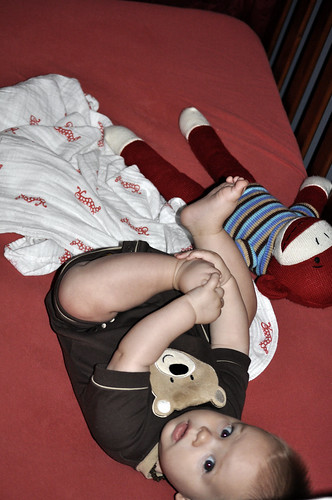7.16.2010
nose in a book: postpartum
It's late in the day, but I just realized that today Elijah is 7 months old.
In the past year I've noticed a trend among women that scares me. We read a lot about pregnancy, attend birthing classes & reach out to one another before our babies are born... then as a new mama we're relatively unprepared for the long haul. I'd like to encourage us to educate & support one another in terms of life-after-baby as much as we do in pregnancy, labor & birth!
Whether or not you plan to nurse long-term, your body will begin the hormonal switch to lactating as soon as birth is complete. How you cope with these changes is as unpredictable as the baby's sleep/eat pattern in those first few days & weeks. Books are great resources in advance, but in the moment of uncertain anxiety or confused tears the best resources are tangible people who know you well. Make certain you have women around who welcome your calls, emails, texts when these moments strike! Lactation consultants have their place, & some women find them enormously helpful. For me it was invaluable to text friends & mothers of young children when I was too choked up to talk clearly. Had I read more thoroughly about nursing/postpartum before Elijah's birth (I was busy freaking out that he was still breech), many of the feelings of crisis could have been overcome more quickly & calmly. Here are the books that I found most helpful:
The Baby Whisperer, Tracy Hogg & Melinda Blau
Even if all you read is the section about differing temperaments among babies, this book is worth thumbing through. Each child is different, but there are techniques to help calm them while reading their non-verbal cues. She covers feeding, sleep patterns, developing a home rhythm & how to remedy accidental parenting. Seriously, no one told me that Elijah wouldn't be textbook: he's what she calls a spirited baby, eating more enthusiastically & napping less frequently than average. Still totally healthy!
I've said it once, I'll say it again...
Mothering the New Mother, by Sally Placksin
Your body's hormonal transition from pregnant to not-pregnant to lactating is the most drastic you will ever endure. It trumps menopause by a long shot. Every mama, after every birth or miscarriage, needs women to nurture her through this time. We need to learn how to do this for each other as well as receive it from one another! Thus, this book is a great resource for: moms, husbands, grandparents, sisters, daughters, doulas, neighbors, anyone really. We were not made to thrive alone, in joy or in sorrow.
Ina May's Guide to Breastfeeding*, Ina May Gaskin
Lactating is as a biological event. Learning to nurse, & helping them learn to eat from you, takes patient preparation both before & after baby arrives. Through storytelling & advice, she addresses baby's needs, your needs, sleeping arrangements, nursing in public & what it means to cultivate a breastfeeding culture. There's no need to be confined to your home or to criticize other viewpoints in order to nurse your baby.
*As a side-note, the story on page 27 (Amazon lets you preview it) expresses sentiments about breastfeeding that echo my experience with Elijah. Because we had a Cesarean birth that couldn't be drug-free, he was slow/weak to latch; it took weeks of pumping & using a nipple shield before nursing felt natural. And it was completely worth it for both of us! I'm very thankful to still be able to breastfeed him. It has healed my soul (along with my body ) to feed, comfort & connect with him in this way. My boy craves mama-skin time, loves to nurse, yet is content with a bottle when necessary. We are very blessed!
deals with:
book reviews,
educate,
literature,
mama,
postpartum
Subscribe to:
Post Comments (Atom)






1 comment:
Joe was born without any interventions or drugs and it took MONTHS before nursing felt natural. You're absolutely right about needing people around for support. Having my husband's mom around and Emily (our doula) really got me through some tough times.
Post a Comment